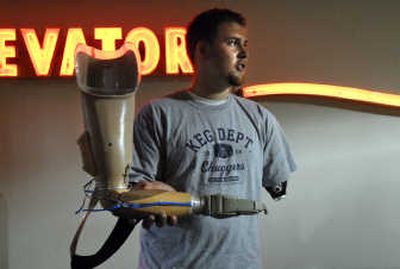This column reflects the opinion of the writer. Learn about the differences between a news story and an opinion column.
Doug Clark: His new arm merges medicine, microchips, quips

Tyler Schilling can control his new computerized bionic left arm with his mind.
OK. I haven’t actually seen him do this.
The 22-year-old Ritzville resident wasn’t wearing the cutting-edge (pun intended) prosthetic when we caught up with each other in downtown Spokane the other day.
So, Schilling walked me to a parking garage and pulled his arm out of his truck.
That was definitely a first for me.
Retrieving the flesh-colored artificial limb, Schilling explained why his case is being hailed as an example of medical pioneering.
Schilling’s left arm was severed above the elbow the afternoon of March 7. It happened when he lost control of the truck he was driving for his job with a Ritzville grain storage facility.
He thinks he may have “drifted off” for a moment. When he came to, the tires had caught on an embankment. Schilling over-corrected. The truck rolled.
His left leg was broken. There were some internal injuries, too, but all of that was fixable.
Schilling’s left arm was another story. It couldn’t be reattached.
Within days after the accident, however, surgeon Doug Smith performed an intricate operation at Seattle’s Harborview Medical Center, transferring delicate hand-controlling nerves into Schilling’s bicep.
The operation’s success, reported the Seattle Post-Intelligencer in a well-researched story, would allow Schilling to “direct a microprocessor-controlled mechanical hand using only his mind, making him one of fewer than a dozen upper-arm amputees in the world with such capacity.”
When the arm is in place, the rewired nerves line up with four sensors that are located on the inside of the prosthetic that cups his stump.
It works like a chain of command: Signals from the brain relay information to the transferred nerves, telling muscles to move. That movement is sensed and sent to the computer, which triggers the prosthetic arm.
Yeah, it sounds easy. Making it happen takes hours of frustrating practice and concentration.
The word “arm” doesn’t really do the device justice.
This, to be accurate, is an Austrian-made “four-channel, myo-electric arm.” Price tag: $90,000.
Schilling is currently using a preliminary version. The final model, said Seattle prosthetist Ryan Blanck, should be ready in about a month.
We truly are living in an age of miracles and wonders.
Surgeons have been transferring nerves for decades. Myoelectric technology has been around, too.
But this merger of medicine and microchips illustrates the advancements that are taking place at breathtaking pace. It’s not too hard to imagine a day when limb replacements will give amputees astoundingly fine motor control.
That day can’t come too soon as more and more veterans return from Iraq with catastrophic injuries.
Schilling is a likable and good-humored guy. He struck me as remarkably well-adjusted regarding his situation.
That’s not an act, said his mother, Patti.
Her son was trying to lighten the mood practically from the beginning.
Patti told a story about a nurse who asked how he came to lose his arm. “Oh, a sword fight,” he quipped.
In reality, Schilling said he’s had plenty of down days.
“It’s something you think will never happen to you until it does.”
Schilling’s grain-shoveling days are over. He hopes to move to Spokane this fall and pursue a career in real estate.
Whatever he does, Schilling’s natural sense of comedy should carry him far.
For example, he told me he was recently standing in a store checkout line, fiddling with the wrist assembly on his wonder arm.
Plop!
The hand abruptly fell off onto the conveyor belt, producing more than a few stares.
Schilling, unfazed, retrieved his appendage and smiled.
Quite a guy, that Tyler Schilling.
Always willing to lend a hand.